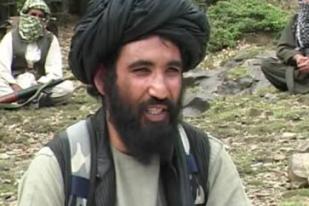Former Taliban commander Mansoor Dadullah captured in PakistanBy Bill Roggio
February 11, 2008 9:24 AM

Former Taliban commander Mullah Mansoor Dadullah.
Mullah Mansoor Dadullah, a senior Taliban figure, has been wounded and captured along with five lieutenants by Pakistan's Frontier Corps, the Pakistani military reported. There are two conflicting reports of Mansoor's captured. The official military line is Mansoor was captured while crossing from Afghanistan into Pakistan, while anonymous sources claimed he was captured in a religious seminary in Baluchistan.
Mansoor was reported to have been wounded during a firefight as he attempted to enter Baluchistan province in Pakistan from Kandahar province, Afghanistan, according to Pakistan's Inter Service Public Relations. Dadullah and his party refused to stop when challenge and a firefight ensued. "Security personnel returned fire. As a result all of them sustained injuries and all of them were captured," Major General Athar Abbas, the military spokesman said.
"Dadullah was arrested alive but he is critically wounded."But unnamed intelligence sources told The Associated Press that Mansoor and his party were captured after a joint police, Army, and anti-terrorism commandos of the Special Services Groups surrounded a religious seminary in the Zhob district of Baluchistan. Mansoor was captured along with associates Haji Lala, Khudai Dad, Khalid Dad, and Abdur Razzak, according to the intelligence source.
The Zhob district appears to be a Taliban staging area.
Mansoor is the second high-profile Taliban leader to be killed or captured in the district over the past year. Pakistani security forces killed Abdullah Mehsud, a senior Taliban leader South Waziristan in July 2007. A senior US official recently stated the Afghan Taliban leadership and command and control is operating in Quetta in Baluchistan. The Pakistani government has denied senior Taliban and al Qaeda leader are inside Pakistan, which may be the reason the military is claiming Mansoor was captured while crossing the border from Afghanistan.
Mansoor was the military commander of Taliban forces in the strategic southern provinces of Kandahar, Helmand, Uruzgan, and Zabul provinces. He took command of Taliban forces in May of this year after his brother Mullah Dadullah Ahkund, a popular but brutal and effective commander, was
killed by British special forces in Helmand province. Pro-Taliban supporters shout slogans during a rally in Killi Nalai [AP]. Click to view.
Mansoor eulogized his brother in May via videotape to a large gathering of 10,000 Taliban supporters in Baluchistan province in Pakistan. "The blood of my brother will never go waste. We will never forget his sacrifices, and the role of other martyrs,? Mansoor said. "We will complete Dadullah's mission by expelling Americans and liberating Afghanistan." The crowd chanted, "Long live Mullah Omar, Long Live Osama bin Laden and Taliban movement."
Mullah Omar, the leader of the Taliban movement, relieved Mansoor of his command in late December. Omar fired Mansoor for failing to live up to the rules of the Islamic Emirate of Afghanistan. "Mullah Mansoor Dadullah is not [in] obedience to the Islamic Emirate of Afghanistan in his actions and has carried out activities which were against the rules of Islamic Emirate of Afghanistan," said Omar. "So the Decision Authorities [or Shura Majlis, executive council] of Islamic Emirate of Afghanistan have removed Mansoor Dadullah from his post and he will no longer be serving the Islamic Emirate of Afghanistan in [any way] and no Taliban will obey his orders any more." It is unclear what role, if any, Mansoor played in the Taliban hierarchy after his dismissal.
The Pakistani government has captured numerous Taliban leaders, yet several have been released in an effort to placate the Taliban in the tribal areas. Most recently, the government freed senior Taliban leader Mullah Obaidullah Akhund, along with Amir Khan Haqqani, two brothers of slain Taliban commander Mullah Akhtar Mohammad Usmani, and a cousin of Pakistani Taliban leader Baitullah Mehsud.
Sufi Mohammed, the leader of the ideological leader of the Tehrik-e-Nifaz-e-Shariat-e-Mohammadi in the Northwest Frontier Province, was freed during negotiations with the Taliban in Swat. Sufi led over 10,000 Taliban fighters against US forces in Afghanistan in 2001 and 2002. Al Qaeda leader Rashid Rauf mysteriously escaped police custody while being transferred from a court to a jail. After the signing of the North Waziristan Accord in September 2006, the government opened the floodgates and released more than 2,500 Taliban and al Qaeda fighters and leaders.
http://www.longwarjournal.org/archives/2008/02/former_taliban_comma.php